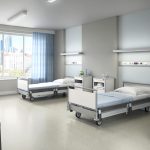Interview with Theo Drepper, Head of purchasing at wissner-bosserhoff
What were the goals of the project?

Covid-19 has greatly increased the demand for hospital beds. In some cases, we even redesigned nursing beds for use in hospitals. It was clear to us at the beginning of the pandemic that we would have to prepare for a very high demand for a longer period. That is why we brought the necessary expertise and required digital tools on board early on with Kloepfel Consulting.
Since our colleagues were also aware that we had to react quickly to the surge in demand, we were able to quickly convince everyone to use external support. It was also important that an employee of Kloepfel Consulting was involved in the procurement team on site during the project. This allowed us to convince all parties involved of the individual project steps and to have short ways to make decisions.
Which topics did you deal with?
The topic of security of supply was at the top of the agenda. This included securing supplies from the Far East. For example, we recognized at an early stage when there were delivery delays due to logistical hurdles. To avoid this, we explored logistical alternatives and capacities. For example, by absorbing logistical bottlenecks through air freight, we were able to secure supplies to our purchasing department and thus deliver to our customers in over 100 countries on time.
Another measure was sourcing in Eastern Europe to keep supply chains short. In some cases, we also ramped up our warehouses with material from our upstream suppliers, as we wanted to play it safe.
To gain more capacity and reduce risks, streamlining purchasing processes and transparency in purchasing were other important topics. To this end, we optimized our reporting tools and were able to both accelerate tender award processes and make them more secure. The new reporting is not only faster, but also providing us and the controlling department with more comprehensive insights. Today, we have a platform or purchasing dashboard that makes all processes and expenditures largely transparent. This saves us and the suppliers a lot of time. Kloepfel Consulting helped us with examples from other projects, which we incorporated into our new controlling concept.
And the digital tools also opened new possibilities for the logistics department, for example, to handle existing freight volumes in an even more customer-oriented and secure manner.
What were the biggest challenges of the project?
A lot of things could not take place in face-to-face meetings but had to be done via video chat. But despite the lack of face-to-face contacts and supplier visits, we overcame the contact limitations together. Today, it is completely straightforward to discuss topics via videochat.
How sustainable is the success of the project?
Our team was able to take away a lot and cut off old habits. Our new processes and tools have now become established among all employees, as they recognize the benefits for purchasing and their work. Ultimately, we can perform better and react faster to market changes in order to continue to be a reliable partner for our global customers.
At the beginning of consulting projects, there is often a fear of additional workload for the organization. What was it like in this project?
That was very limited. One reason was that we integrated Kloepfels project team into our IT right from the start. This means that the colleagues and coaches were able to independently obtain the data sets and information they needed from purchasing on a temporary basis. This avoided friction losses due to constant queries and ambiguities. In addition, we always had a fixed contact person on site and each next project step was discussed weekly with everyone involved to keep to the tight schedule.
How did you manage to get the employees on board for the project?

Our team quickly realized that valuable know-how was coming into the company and that they could expand their horizons with Kloepfel Consulting. The more often meetings were held together and the closer we worked together, the more they found their way to the external consultants. In addition, the “external” purchasing colleagues also quickly found their way into the team on their own initiative. As a result, everyone was open to the project.
What is the longer-term vision for purchasing?
The level of digitization and automation in purchasing will increase significantly in all industries. Especially since the advantages of digital tools for working from home or for contactless video chats have become established during the Corona crisis. Nevertheless, I consider personal contact to be essential, especially with the important suppliers with whom you want to go through thick and thin. These personal partnerships are the be-all and end-all of down-to-earth purchasing.
What is the conclusion of the project?
The project is not quite finished yet, but so far, we are more than satisfied with the support. The consultants from Kloepfel Consulting had our backs and gave us sustainable time for the important strategic issues, such as supply security. And also, interpersonally everything worked very well. Therefore, I can recommend an appointment with Kloepfel Consulting to everyone.
About wissner-bosserhoff

Wickede (Ruhr) based wissner-bosserhoff GmbH is a leading supplier of innovative, high-quality bed and furnishing solutions for hospitals, retirement homes and inpatient care units. The group’s organic growth is ensured by a consistent combination of technological and design expertise in the customer-oriented development of new products and by the use of efficient production and procurement processes.
wissner-bosserhoff GmbH is part of LINET Group SE, which in the 2018/2019 financial year generated gross sales of around 287 million euros with more than 1,600 employees, as well as producing around 100,000 high-quality nursing and hospital beds and selling them in over 110 countries worldwide.
Contact
Christopher Willson
Tel.: +49 211 882 594 17
Mail: rendite@kloepfel-consulting.com
